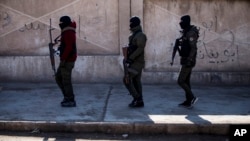Two rockets targeted coalition forces in northeastern Syria on Wednesday, according to U.S. Central Command, a day after Iran and Iraq commemorated the third anniversary of the death of Iranian Quds Force leader Qassem Soleimani in Baghdad.
“The attack resulted in no injuries or damage to the base or coalition property,” CENTCOM said.
CENTCOM spokesman Lt. Col. Dave Eastburn told VOA the 107-millimeter rockets targeted an area known as “Mission Support Site Conoco” at 9 a.m. local time in Syria. Syrian Democratic Forces later went to the site where the rockets were fired from and found a third, unfired one.
"Attacks of this kind place coalition forces and the civilian populace at risk and undermine the hard-earned stability and security of Syria and the region," CENTCOM spokesman Col. Joe Buccino said.
No one has claimed responsibility. Iran-backed militias have previously carried out rocket and drone attacks against U.S. and coalition forces in both Syria and Iraq.
One year ago, U.S. forces thwarted attacks on January 3 and 4 by suspected Iranian-backed militias. The attackers launched explosives-laden drones that were shot down near Ain al-Asad Air Base and near Baghdad International Airport, which is also used by the international coalition. “Soleimani’s revenge” was written on the wings of one of the drones.
Soleimani was head of Iran’s elite Quds Force, the foreign operations arm of Iran’s Islamic Revolutionary Guard Corps. A U.S. airstrike on January 3, 2020, killed Soleimani alongside Abu Mahdi al-Muhandis, the top commander of Iraq’s Popular Mobilization Forces.
At the time of his death, administration officials said that Soleimani was involved in planning an “imminent” attack that would put U.S. lives at risk.
Wednesday’s rocket attacks also coincided with a Turkish aerial offensive dubbed Operation-Claw Sword, which has targeted Kurdish forces in Syria allied with the United States in the fight against Islamic State.
According to the Syrian Democratic Forces, attacks by Turkish forces in northern Syria killed 16 civilians in December.
Turkey alleges some members of the SDF are part of the Kurdistan Workers’ Party, or PKK. Ankara and Washington both consider the PKK to be a terrorist group but the U.S. military does not associate the SDF with the PKK.
White House national security spokesman John Kirby said last month the United States does not want Turkey to pursue military attacks in northwest Syria, even if it recognizes Turkey's right to defend itself.
The SDF has warned that fighting a new Turkish incursion would divert its resources needed to guard the al-Hol prison that is holding Islamic State militants and fight Islamic State sleeper cells in Syria.








